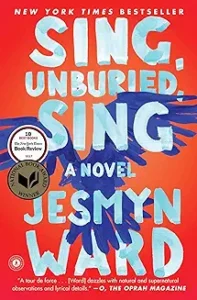Sing, Unburied, Sing by Jesmyn Ward 2017
When two of Ward’s books were among the 100 Best Books of the 21st C. listed by the New York Times in a recent Sunday Book Review, I thought it was time to read her.
Since “Sing, Buried, Sing” was also named one of the ten best books of 2017 by the NYT, I chose this novel. It tells the story of a family in today’s Mississippi delta. Pop and Mam live with their daughter, Leonie and her two children, JoJo and Michaela. Leonie, who is Black, has a white husband whose parents hate Leonie. At the beginning of the novel, her husband, Michael is incarcerated at the dreaded Parchman prison in the northern part of the state, a place where Pop served time with his brother when he was a teen-ager.
The book is beautifully written. Some pages read like poetry. Ward describes the landscape, the relationships between the family members, and the ‘unburied’ ghosts of Leonie’s brother, Given, shot by his white ‘friends’ when he beat them at a hunting contest and Richie, a 12 year old imprisoned at Parchman who Pop tried to protect. Poverty, meth, bigotry, lynching, and family disintegration fill the pages with painful realities, and at times, I had to put the book down for a few days to recover my balance.
Here’s one of Ward’s lyrical passages: “Across the face of the water, there is land. It is green and hilly, dense with trees, riven by rivers. The rivers flow backward: they begin in the sea and end inland. The air is gold: the gold of sunrise and sunset, perpetually peach. There are homes set atop mountain ranges, in valleys, on beaches. They are vivid blue and dark red, cloudy pink and deepest purple. They are yurts and adobe dwellings and teepees and longhouses and villas. Some of the homes are clustered together in small villages: graceful gatherings of round, steady huts with domed roofs. And there are cities, cities that harbor plazas and canals and buildings bearing minarets and hip and gable roofs, and crouching beasts and massive skyscrapers that look as if they should collapse, so weirdly they flower into the sky. Yet they do not.” The words are spoken by Richie as he listens to the family from under the house.
While I’m not a big fan of the supernatural, Ward’s introduction of two dead characters as narrators in some chapters works very well. Life, death, meaning, love, hate, and above all family are the themes in this superb novel with racial hatred and bigotry as the constant background. If you, like me, had not read Ward, do so by all means, but be prepared to be shaken and awakened.



